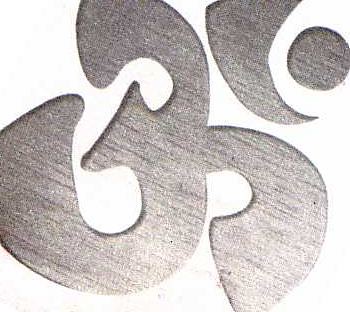A couple of days ago, Mary was saying that when she returned to yoga class after a hiatus, the asanas came back easily, but chanting OM at the beginning of the class proved more of a challenge. Mmmm, interesting that.
Sometime in early April, I completed my thousandth hour of teaching yoga. That is a lot of teaching, I am sure you will agree. Although I still keep a log in case I need it at some future time, I am no longer totaling the hours, but I would guess that I have taught a few hundred extra hours since. So much teaching has changed many things about my style, but one of the most noticeable changes has been to my voice. Those of you who have been practicing with me for a few years may have observed this: the pitch of my 'teaching voice' has dropped, and, most of the time, I am able to project sufficiently. This was not always the case.
Nor was it always comfortable for me to get up in front of a group and lead the chant to start class. Now I do it all the time, and often chant other things too! I really love vedic chanting, one of the reasons I am so excited to return to KYM. More chants learned and taught, yay!
As my voice has changed, I have observed how others use theirs. Mary's chanting issues are so incredibly common. I notice that many people just can't make a sound issue from their throats, and many others, mostly women, chant from the top of their throats in a falsetto.
Now, think about the link between sound pitch and power. Do you find you are more inclined to listen to a speaker with a low melodious voice, or one with a high, wavering one? Thought so.
Strangely, several people have told me they were taught to chant in a high voice. I will keep to myself my political views about women being taught (not) to use their voices. But if you chant from deep in your guts, the sound resonates powerfully from, well, deep in your guts. And to my mind, this makes it far more effective. Try it, try it at home if you have to!
Chanting OM is a great place to start since it is, after all, the pranava, the great syllable - as Wikipedia says,
praṇava, from a root nu "to shout, sound, praise"
If you know other chants, and like them, chant those. Use your voice - shout, sound, praise!
PS when I return to SA, if enough of you are interested, we can have a chanting workshop. Lots of fun!
PS when I return to SA, if enough of you are interested, we can have a chanting workshop. Lots of fun!



3 comments:
I have always loved vedic chants, and KYM brought out the chanter in me.
The thing is, hearing good, traditional vedic chanting always makes me cry -- something about it touches something that is deep inside.
The last time at KYM I asked our chanting teacher about that and she told me that chanting breaks open something that has been locked away inside, that is why I cry. She told me to cry and chant at the same time because it will be cleansing! I also read that the throat chakra (and chanting balances the that chakra so we can speak our truth) is between the heart and the mind, so chanting links the intellect and the heart. Makes sense!
My teacher, Srivatsa Ramaswami (one of the original trustees of KYM), is known as a chant master in India, he has many CDs. He studied with Krishnamacharya for over 30 years. If you want to hear the real deal in chanting, get one of his CDs, http://www.vinyasakrama.org...
OM NAMAH SHIVAYA!
i personally love a low-pitched om chant as the vibrations are stronger and resonates well with my skull cavity (and the rest of my body). and you made a good point about the speaker with low melodious voice. i never thought about linking that with good and strong vibes
I am very curious about the connections between sound and healing. I have studied a little from the Zen perspective (http://blogs.glam.com/glamspirit/2007/08/01/sound-and-healing-the-power-of-kiai/ where we trained to use our hara which seems to be that deep in your guts part that you're talking about here Nadine. After one weekend of this intense training my voice dropped and I was getting the gist of this. Like Linda, chanting often makes me cry.
Post a Comment